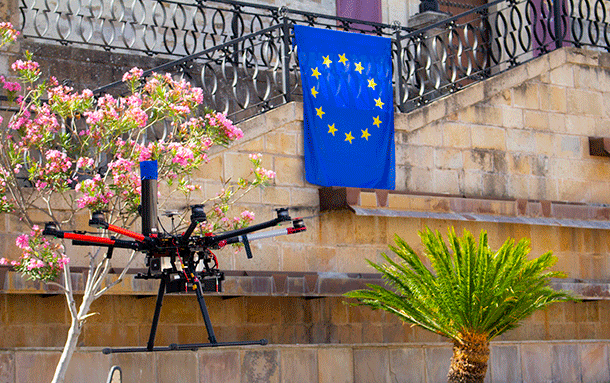End of the drone standardization trials with Europe’s GNSS systems

Late June saw completion of the third set of trials under the EGNSS4RPAS project for Europe-wide standardization of uncrewed aircraft (RPASs, UAVs and drones).
In collaboration with FADA-CATEC, GMV is one of the partners of this VVA-led project, which aims to standardize EGNOS and Galileo services in aircraft like drones, RPASs (Remotely Piloted Aircraft System) y UAVs (Unmanned Aerial Vehicle).
Under this project three test campaigns have been carried out (firstly, on 19 March; secondly, on 22 and 24 April; and, finally, on 25 and 26 June) with the common aim of weighing up the potential performance of Europe’s navigation systems (Galileo and EGNOS) in the emerging and opportunity-packed field of drones, in relation to air traffic management or typical applications in built-up environments like package delivering, emergency healthcare products, building inspections and critical infrastructure, etc.
The first two trial runs were conducted on the site of ATLAS, an experimental flight center belonging to the FADA-CATEC consortium and one of Europe’s cutting-edge research centers. ATLAS has all necessary wherewithal for carrying out tests of this type, with an aerodrome exclusively for drones and a large segregated airspace, minimizing the chance of undesired encounters with other aircraft. The third test was carried out in the built-up environment of Villacarrillo (Jaén), after duly obtaining all necessary permits from the Spanish Air-Safety Agency (Agencia Española de Seguridad Aérea: AESA).
The European Commission is keen to demonstrate that its navigation systems could input an added value. In each test, therefore, the drones were fitted with magicUT, the GMV-developed user terminal enabled for SBAS (Satellite Based Augmentation System) and PPP (Precise Point Positioning) applications. magicUT can then assess performance in different scenarios and working environments. magicUT has thus enabled the European systems’ positioning performance to be compared with its American opposite number, GPS. As well as showing that, in most cases, it already outperforms GPS, another particularly noteworthy result was the more precise and robust performance achieved when these systems are used in combination rather than separately.
The European Parliament and Commission have recently approved the drone-operation regulation. This third round of trials in Villacarrillo represents an aviation milestone as the first in Europe ever to follow the methodology laid down in this new regulation, in particular a Specific Operation Risk Assessment (SORA) before awarding of the drone permit.
Over the next few months an analysis will be made of the test results, including a cost- and viability-assessment for promotion of Europe’s navigation systems to the UAS user community.